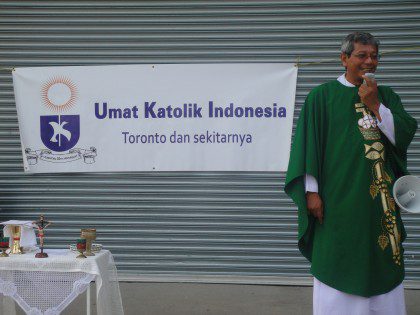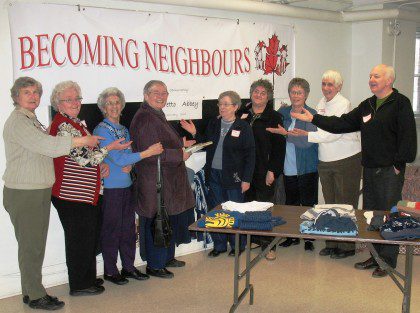
“Internationality is essential to our development as a congregation. All of us here are a result of the congregation’s commitment to mission.”
Fr. José Ornelas Carvalho, SCJ, Superior General, speaking to major superiors at their July meeting in Neustadt, Germany
It only took five years for the Priests of the Sacred Heart to move beyond their birthplace of France, expanding their presence to the Netherlands, Belgium and Rome.
Within 10 years the congregation’s first missionaries were headed to South America. In 1897, it was Africa, with the arrival of Dehonians in Congo.
Dehonians came to Canada in 1910, paving the way for the SCJ presence in North America. Over 100 years later, the congregation continues to be present in Canada, and now more than ever, reflects the international face of the Priests of the Sacred Heart.
As previously noted Canadian Region’s Dehon House in Ottawa has long been an international one. Montréal as well is an SCJ community that includes members of the congregation not only from French-speaking Canada, but from Asia and Africa too.
Six years ago, Toronto SCJs made a commitment to internationality, both as a community and in ministry.
“[In 2006] we came together to draw up a pastoral plan designed to respond to the changing demands of the Greater Toronto Area (GTA),” said Fr. Jim Casper, SCJ. “Toronto is a multicultural city whose population of approximately 6.5 million includes people from Asia, Europe, Africa, Central and South America, the Middle East and the Caribbean.
“Every weekend in Toronto the Eucharist is celebrated in over 35 languages!”

Outreach to Indonesian community
For 31 years SCJs in Toronto have had a special ministry to the large Indonesian community in the area. It began when Fr. Wayne Jenkins, SCJ, then associate pastor at St. Joan of Arc parish, met a few Indonesian Catholics at a grocery store. Fr. Wayne had lived in Indonesia for several years and enjoyed connecting with people from the country. He invited them to come to St. Joan of Arc where he would celebrate a Mass in the Indonesian language.
A chance meeting in a store evolved into a full-time ministry to the Indonesian Catholic community in Toronto. Umat Katholik Indonesia now includes approximately 3,000 members.
When Fr. Wayne left Toronto for a new assignment, the archbishop of Toronto asked if the SCJs could continue the ministry. It was then that the Toronto community began its collaborative relationship with the Indonesian Province, which sent an Indonesian SCJ to replace Fr. Wayne in the early 1980s.
“When the first of our Indonesian confreres arrived, the naïve assumption was that he, and others, would adapt to our way of life, and ultimately, adopt our view of Church, of SCJ religious life and our world view,” said Fr. Jim. “What in fact ensued was a challenging dance in which both new arrivals and those already settled were drawn toward adaptation and change.”
The community was drawn toward a commitment to not simply live as individuals from different countries and different cultures, but to live as an international community flavored by all of the cultures within it.
“To be a part of an international community means being open and vulnerable, and perhaps most importantly, humble enough to learn from our brothers of every age and culture,” said Fr. Peter McKenna, SCJ, another long-time member of the Toronto community. “It is only through this openness and humility that we can grow to be a truly international and intergenerational Dehonian community.”
Fr. Peter not only lives internationality at home, but ministers full-time with “Becoming Neighbors,” an organization devoted to refugees and newly arrived immigrants in Toronto. He is pictured below with staff.
“Living internationally calls all of us to contribute our best gifts to ministry, to the congregation and to the Church,” he said. “It invites each one of us to let go of pre-conceived ways of doing things.”
Fr. Aegi Warsito, SCJ (pictured above), the most recent member of the Indonesian Province to serve UKI, said that after several years of working and living in Toronto the idea of “We the Congregation” had really taken root in his heart.
He said that for him, one of the great joys of living in an international community is the opportunity to learn about and accept other cultures. In Indonesia he felt that his identity, who he was as an SCJ, “was tied to being a member of the Indonesian Province,” not to the wider congregation.
But now, he says, “I can go anywhere at anytime and minister as a Dehonian;” a member of a religious community that transcends national borders.

International outreach grows
For many years, the Toronto community’s ministry to Indonesian Catholics was its only significant international outreach. But as Fr. Jim Casper said, six years ago the community created a pastoral plan to better meet the needs of the international city in which they lived, based out of an international sense of community.
“We asked the Canadian council to consider inviting an SCJ from Brazil to join us,” said Fr. Jim. “The Archdiocese of Toronto is desperate for Portuguese-speaking priests to minister to the growing Portuguese-speaking population of Toronto (it is estimated that there are approximately 115,000 Portuguese-speaking people in the city).
Inviting an SCJ from Brazil to join the Toronto community would address a need in the local Church, “but it would also add something to our SCJ community,” said Fr. Jim. It is a way for the community to better reflect who the Priests of the Sacred Heart are, and “for us as a local community to reflect the multicultural nature of Toronto.”
Fr. Willyans Prado Rapozo, SCJ, is the first Brazilian SCJ to join the Toronto community; he arrived in May.
“I always had a dream of being a missionary priest,” said Fr. WilIyans. “I thought my provincial superior would send me perhaps to Africa or the Philippines.”
But instead, Fr. Willyans was asked to be a “missionary” to Canada.
“I wondered, how would coming to Canada, a country well developed with lots of resources, be the work of a missionary?” he said.
But in a few short months he has learned much about the needs of the people of Toronto, including the “impact of secularization,” he said. “I minister at St. Mary’s Parish, a beautiful community, but a community also experiencing tremendous changes. Located on the fringe of Toronto’s inner city, its base continues to be a vibrant Portuguese community but the area in which it is located is going through a gentrification process.” A process that risks alienating many of the less affluent residents of the area.
This is Fr. Willyans first experience of living in an international community but he follows the tradition of many of his countrymen who are now found throughout the world.
“Our province has members in Germany, Italy, Congo, Mozambique and in the Philippines,” he said. “In South America we are in Ecuador, and next year in Paraguay.”
What is his personal experience of living and ministering in an international community?
“Everything is different,” he said. “The lifestyle, the way we pray, the way we are responsible for each other and for our community house. One of the challenges for me is to understand differences. We come from many different places and cultural heritages. There are many things that we need to learn together.
“I thank God that I can speak English but knowing the words doesn’t necessarily mean that you understand fully the meaning of what is being said.”
“We hope that we can continue to be blessed with a broader representation from the international SCJ community so that the local community reflects more clearly the multicultural face of Toronto,” said Fr. Jim. “We would like to expand our response to the growing need for ministry among the Portuguese, Spanish and Chinese-speaking populations of Toronto as more members of the Priests of the Sacred Heart accept the vision of internationality presented by the General Council in its letter for the feast of the Sacred Heart.”
As Fr. General said to the major superiors at their recent meeting in Germany:
“Internationality is essential to our development as a congregation. All of us here are a result of the congregation’s commitment to mission.”
